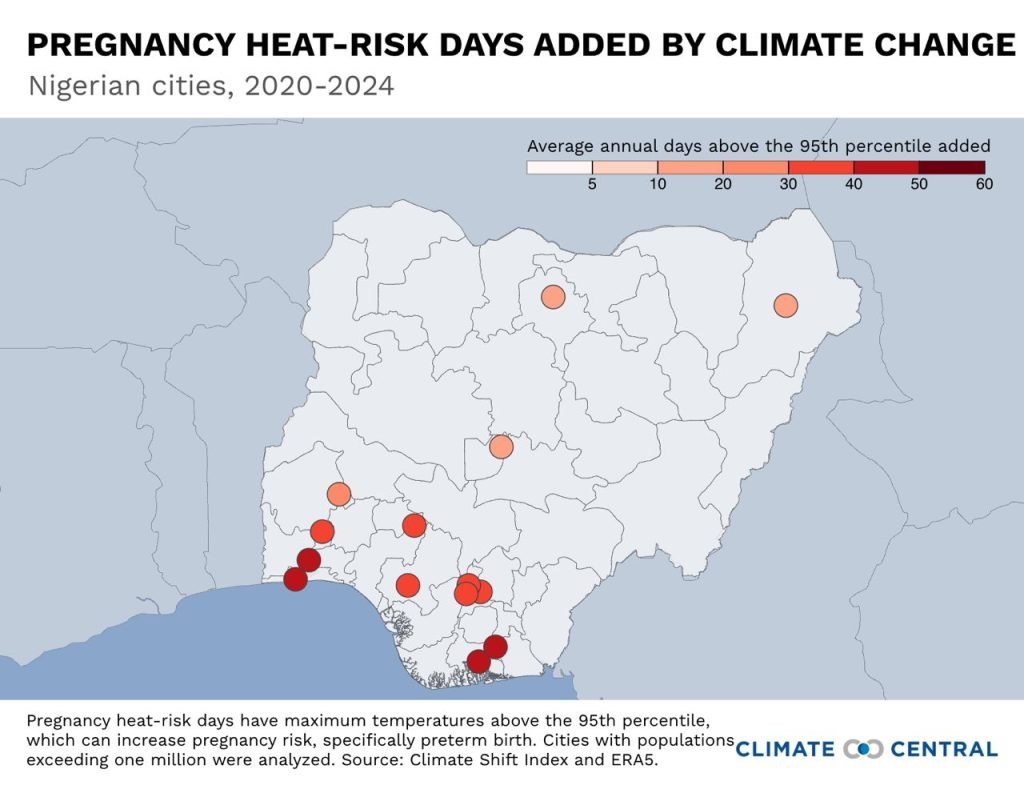A new global analysis has raised serious concerns about the escalating health risks extreme heat poses to pregnant women, with Nigeria identified as one of the most affected countries.
The report, released by Climate Central, reveals that climate change has significantly increased the number of dangerously hot days for expectant mothers. Major urban centres in Nigeria, such as Lagos, Port Harcourt, and Aba, are facing some of the highest levels of heat-related pregnancy risks globally.
These high-risk periods, referred to as pregnancy heat-risk days, are days when temperatures exceed the 95th percentile of historical local highs. Such conditions have been linked to increased rates of preterm birth, stillbirth, pregnancy-related hypertension, and other serious maternal health complications.
Nigeria’s Mounting Heat Burden: Lagos and Port Harcourt Among the Most Affected
Between 2020 and 2024, climate change was responsible for 68% of all recorded pregnancy heat-risk days in Nigeria, contributing an average of 21 additional high-risk days per year. In certain cities, the impact has been even more pronounced.
Lagos recorded 57 out of 68 annual heat-risk days (84%) as directly attributable to climate change. Similarly, Port Harcourt experienced 49 out of 58 days (84%) driven by rising global temperatures.
“This kind of heat is not just uncomfortable — it’s unbearable for pregnant women and poses a serious threat to both maternal and infant survival,” said Dr. Daniel Musa Gwary, Director for Arid Zone Studies at the University of Maiduguri.
“These are not abstract statistics. Each heat-risk day represents a tangible danger to maternal and newborn health, particularly in countries like Nigeria where access to quality healthcare is limited,” added Dr. Bruce Bekkar, a women’s health expert specialising in climate-related health impacts.
Drawing on data from 247 countries and territories and nearly 1,000 cities, the Climate Central report found that:
* In 90% of countries, climate change has doubled the number of pregnancy heat-risk days.
* In nearly one-third of these countries, pregnant women now face over a month’s worth of additional extreme heat each year.
* The most severely affected regions include sub-Saharan Africa, Southeast Asia, the Caribbean, and parts of Central and South America — areas that contribute the least to global greenhouse gas emissions.

Nigeria already grapples with high maternal and infant mortality rates. The added burden of rising heat makes this a looming public health emergency.
Health professionals and climate scientists urge policymakers to integrate climate adaptation measures into maternal healthcare systems, especially in urban heat hotspots.
“Even a single day of extreme heat can significantly raise the risk of pregnancy complications,” warned Dr. Kristina Dahl, Vice President for Science at Climate Central. “This is not a future concern it is a present crisis putting our most vulnerable populations at serious risk.”
The report underscores the urgent need for global and national action, including immediate reductions in fossil fuel emissions and investment in heat-resilient infrastructure across Nigerian cities.


 Trending
Trending 